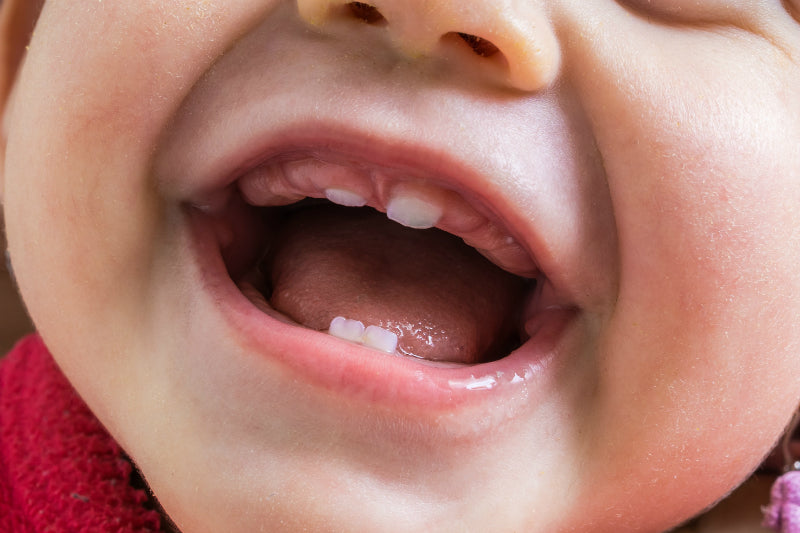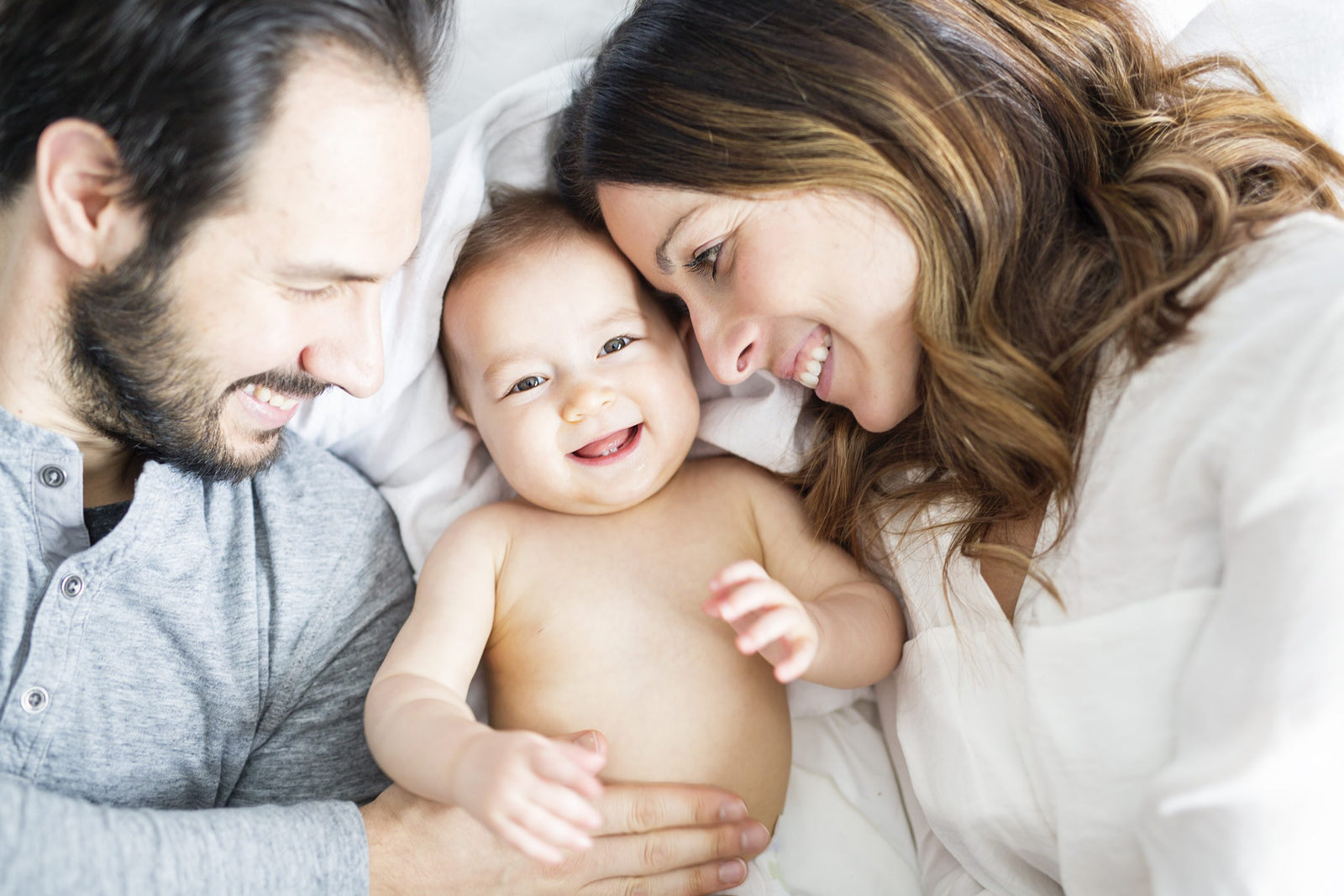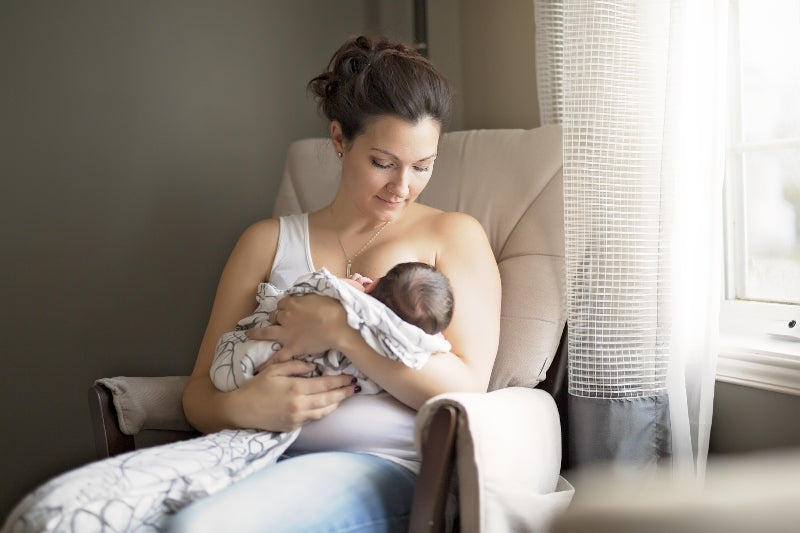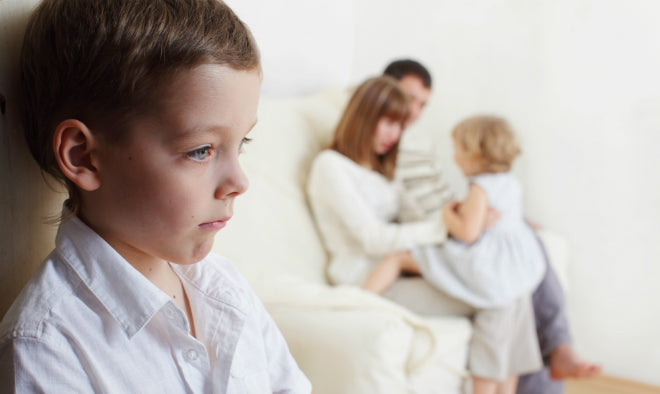"How to relieve pain and take proper care"
A smile without teeth only looks stunning on babies. A child without teeth will certainly not have such a beautiful smile in later life. However, it will be some time before your child has all their teeth. It gets exciting when the first tooth comes in. Some parents don't even notice and are shocked when something white suddenly peeps through the gums. Other parents, on the other hand, suffer with their children, as teething is a painful process for some babies. But of course this is not the case for all children. To help those who experience discomfort when teething, here are a few useful tips for moms and dads of nappy-wearers who are teething.
When does the first tooth appear?
First of all: teething is a natural process and not a disease. You should be aware of this and carefully consider the symptoms of your little one. Even if you read in many places that a teething baby sometimes has a fever and even diarrhea, this is simply not correct. At most, the temperature will rise a little and the stools may be softer than usual. Fever and diarrhea, on the other hand, are clear signs of an infection and should be checked out by a pediatrician.

When does the first tooth appear
When the first tooth makes its way through the gums varies. As a rule, the lower incisors come in first, followed by the upper incisors and the lower and upper canines. However, there is no guarantee that your little darling will stick to this order.
Babies usually get their first tooth around the sixth month. Some a little earlier, others a little later.
How do I notice that my baby is starting to teethe?
Your little one will give you a few clues when he or she is struggling to teethe. From one day to the next, there seems to be an insatiable urge to bite. Everything the little diaper wearer gets his hands on is used to bite on. Even if the first teeth have broken through without much fuss, the molars will demand a little more and you will notice this.
Chewing and salivating are unmistakable signs
Babies often put their hand in their mouth and chew on it. They rub their cheeks and the flow of saliva increases dramatically. Here you are well advised to have an extra bib or two to hand.

Babies often put their hands in their mouths
Cotton cloths also become a very useful accessory when teething to cope with all the saliva. Another sign is red cheeks.
Can I still breastfeed?
Yes, if you are breastfeeding your little one and teething begins, this will not have a negative effect. Your baby will not bite you as long as it is drinking. Just make sure that you take your little one off the breast in good time when it is full and no longer sucking. Otherwise it could try to "accidentally" bite you.
How can I help and support teething?
Of course, you are not completely helpless in the face of this. Although your little sunshine has to go through it alone, a few old household remedies can help to make the pain more bearable. As long as your teething baby allows it, you can gently massage their gums with your finger. You can also use a soft cloth that you have cooled slightly in the fridge beforehand.

How can I help and support teething?
Your pediatrician will be happy to advise you on this topic if a painkiller is required. Various ointments are available, which you should preferably apply at night so that your little one can sleep better. For very extreme nights or days, you can also use a suppository to relieve high temperatures and pain. However, this must remain the absolute exception and should be discussed with a doctor.
Teething rings become an important companion
When your child is teething, they will chew on anything they can get their hands on. Therefore, make sure that you don't just give him anything, but a teething ringthat has been specially developed for these times.

Also remember that you should have at least two or three of these nibble rings. Because every now and then one might get lost or a visit to the grandparents is on the cards and then it's better to have a teething ring to hand there too.

Some models are filled with water. You can put them in the fridge to cool them down. However, please never put them in the freezer. The rings will get too cold there and harm your baby.
And the pacifier?
Sometimes even the pacifier is a good alternative. This also helps in any case when your baby is teething. The pacifier then performs two important tasks.
Firstly, it gives your little one something to chew on and secondly, it is naturally very soothing.
If you are out and about, then think about a pacifier chain. This prevents the pacifier from getting lost.

When teething, it is now extremely important to change the pacifier frequently. Check the condition of the pacifier regularly to ensure that no parts come loose or can be bitten off and swallowed.
How can I keep clothes dry from saliva?
While you can easily change clothes quickly at home, this is of course more problematic when you are out and about. You should therefore use a bib or a triangular scarf to keep your outer clothing dry. A second bib is very practical, especially if you are going to be out and about for a while.
Also remember this if you are already taking your baby to childcare, for example to nursery. Sufficient changes of clothes and bibs are important accessories that you cannot do without when teething.
Dental health from the very first tooth!
Oral hygiene doesn't just start with a full set of teeth. At first, you didn't need to worry too much about this.
Now it's time to start cleaning them properly.
Even the first tooth needs to be cleaned and cared for properly. Although you don't need to start using a large toothbrush just yet, the tooth and later the next teeth should of course also be cleaned in the evening.

Dental health from the very first tooth
There are special toothbrushes for babies on the market. Ask a dentist for advice on dental health. Above all, it is important that your baby learns right from the start that dental care is simply part of the daily hygiene program. The more naturally such everyday things are taught, the easier it will be to teach your child proper oral hygiene in the years to come. When small children can hold the toothbrush themselves, they can try it out. Of course, you will have to brush again afterwards. However, your child will feel confirmed and, above all, grown-up if they can actively participate in brushing their teeth.











